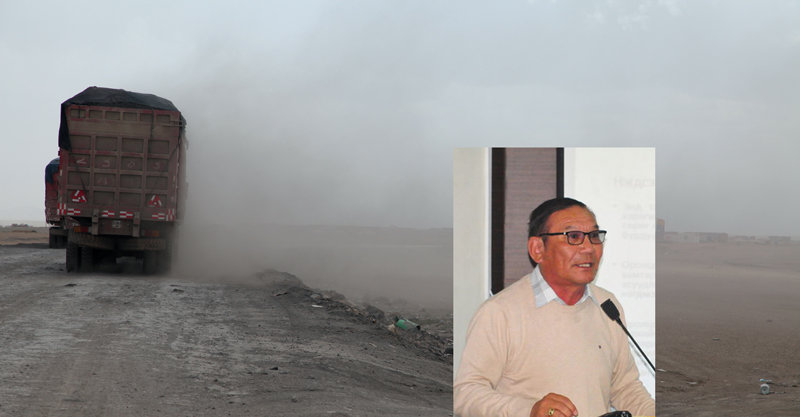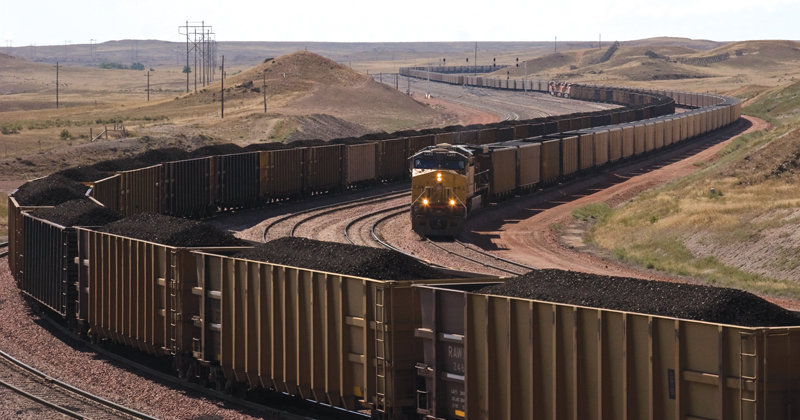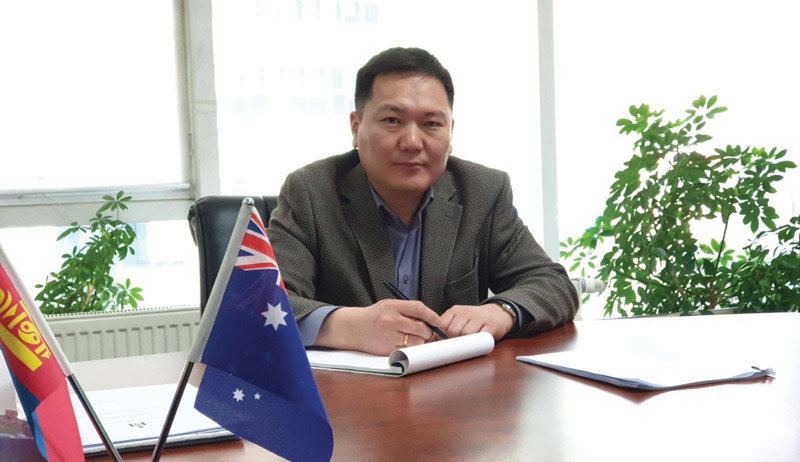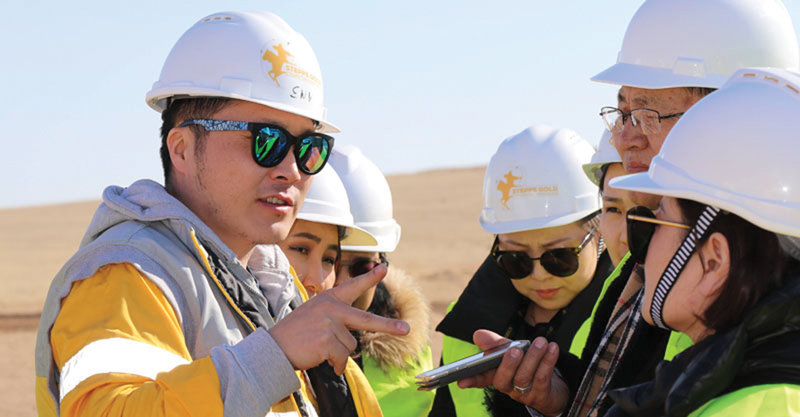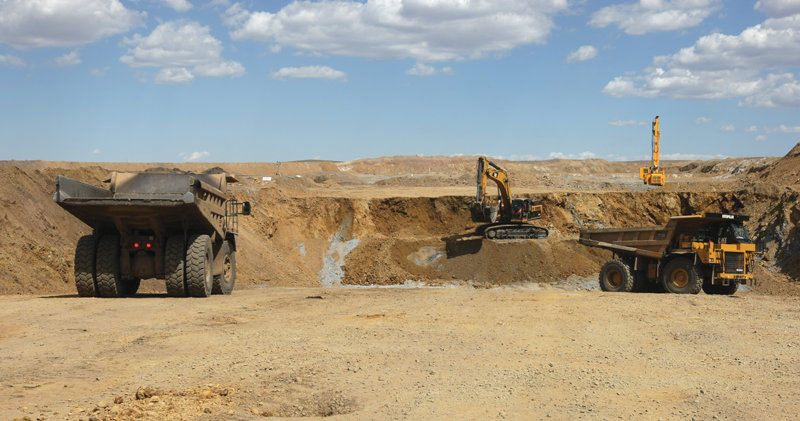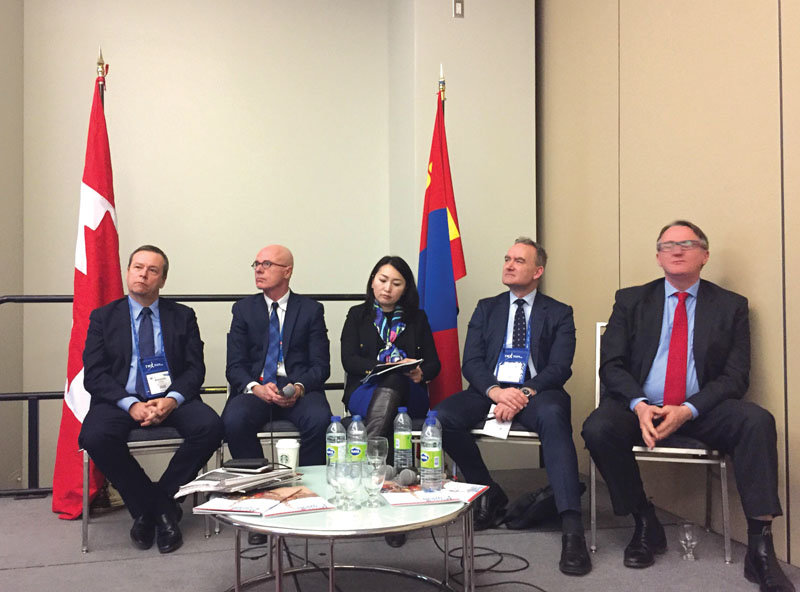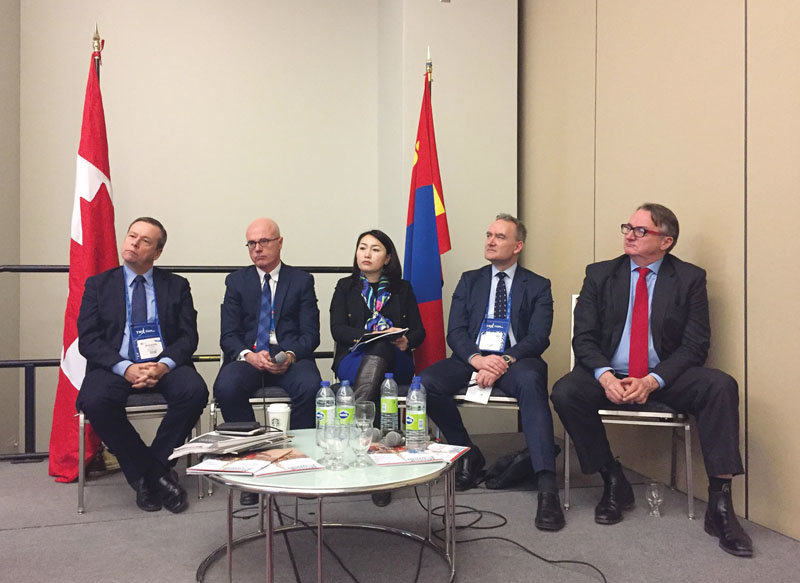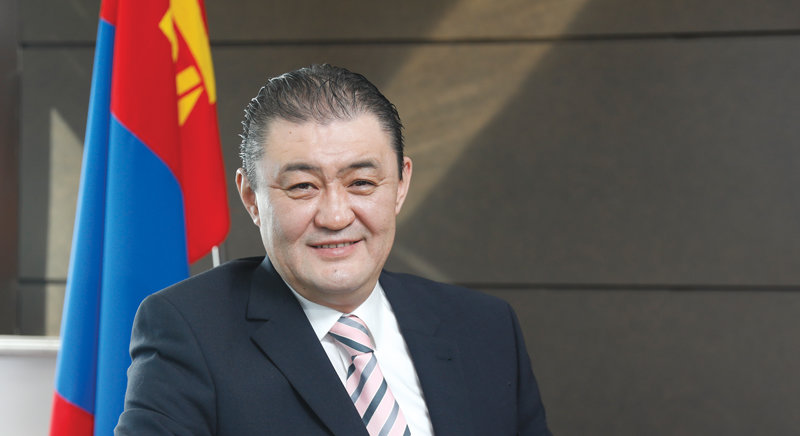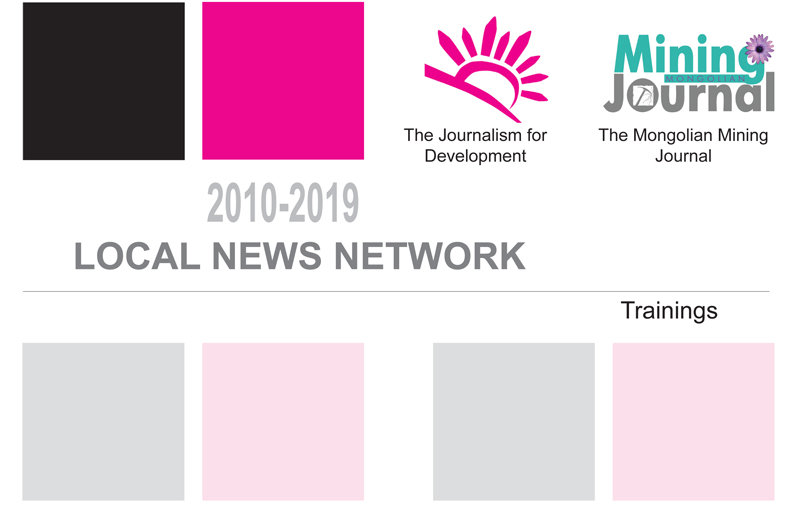Recent news
“Mining harming the whole ecosystem in Tsogttsetsii”
O.Badarch, Governor of Tsogttsetsii soum in Umnugovi aimag, tells Ch. Sumiya that while mining has brought prosperity there and to the 20,000 people now calling it home, its negative impact on the environment is taking disastrous proportions.
How many mines are active in Tsogttsetsii soum?
Our aimag has 15 soums, and Tsogttstetsii is the smallest of them, only about 7,000 square hectares. Some 16 percent of this is under mining licences. Three large projects -- the State-owned Erdenes Tavantolgoi, the locally-owned Tavantolgoi, which is the first mine of the aimag, and the privately-owned Energy Resources -- are extracting at the Tavantolgoi group of deposits, together exporting about 20 million tonnes of coal annually. There are 20-30 subcontractors removing soil.
Vancouver workshop discusses resource governance
There cannot be ‘one recipe’ for good resource governance in all countries with mineral wealth, given their variety, but most such countries can, and are trying to, improve their governance practices. That is the impression this reporter gathered at the CIRDI (Canadian International Resources and Development Institute) workshop on Leading Practices in Mineral Resource Governance, held on April 24-25 in Vancouver, Canada. Officials and non-officials from 13 countries -- Argentina, Peru, Ecuador, Senegal, Sweden, Mongolia, Guyana, Chile, Ethiopia, Vietnam, Colombia, Kenya, and Canada -- participated in the workshop, exchanging experiences. Some of them are in an initial stage of developing their mineral sector, while some others are in an advanced stage of such development.
“Mining brings development to the community”
S. Batkhuu, CEO of Tsairt Mineral, tells D. Ulaanaa that his company wants to be a model of responsible mining and asserts that constructive cooperation with the local community is very much possible.
Zinc is the main mineral processed at the Tomortiin Ovoo plant. Has any other mineral been found at the deposit?
Tomortiin Ovoo is primarily a deposit of zinc, but the ore has other minerals mixed in it. It is not yet known if they have any commercial value. Minerals of many types are found underground but it is impossible to extract all of them. Our zinc ore has in some cases silver mixed in it. We can sell this but if any mineral is found in the concentrate we export, we have to pay royalty on it.
The railway riddle
As he laid the foundation stone of the 414.6-km railroad between Tavantolgoi and Zuunbayan on May 24, President Kh. Battulga noted that something was at last happening on the ground to implement the State Policy on Railway Transportation adopted by Parliament in 2010. For nine years, he said, domestic politics and politicians with personal stakes in coal mining had not allowed anything to move.
Recalling his days as Minister of Road Transportation in the coalition government, Battulga said he had tried to build the railroad in the northern part of the country. He had formed a team, determined routes, signed agreements, laid foundation stones, obtained loans and had spent some of the money, too. Yet, not one km of railroad has been built. There is only piled earth and crumbling embankments on the route from Tavantolgoi to Gashuunsukhait.
Mongolia’s Smart Mining Market is Growing
Mongolia is of great interest to companies in the field of Industrial Internet of Things (IIoT) with Smart Mining solutions market to reach $10 million soon, says report of Finnish-Russian developer of Artificial Intelligence and IIoT solutions ZYFRA. “Mongolia is of great interest to companies in the field of Industrial Internet of Things. Digital solutions for mining are one of the prospective areas. Currently, this market is valued at around $5-7 million annually. According to my estimates, it will reach USD 10 million very soon
“We are and will be here, as we believe in the strength and potential of the Mongolian natural resources sector”
RPMGlobal is a global leading mining technology products and consulting services provider with 50+ years of experience. We are publicly listed in ASX since 2009 with 23 offices in 13 countries and have worked in over 125+ countries to keep the mining industry at the forefront of change, incl. Mongolia, Kazakhstan and China in the North Asia Region. We operate in the major mining regions by a global team structure with our over 400 technical consultants and 2000+ leading associates in a broad network. We have operations in all of the world’s key mining locations enabling us to provide experts who understand the local language, culture and terrain.
“Ovoot will be an exemplary project”
Aspire Mining is a public company registered at the Australian Stock Exchange. Its operations in Mongolia began in 2010, and it has always tried to contribute to the social and economic development of Mongolia and to observe or even go beyond the high standards of environmental protection here. The company has more than 2,400 shareholders, the majority of them Mongolian, who together own more than 30 percent of shares.
Mining responsibly: a day at Altan Tsagaan Ovoo
As far as I knew, it was the first time a mining company in our aimag would be opening its doors to media people. I had earlier been on such acquaintance tours to large mine sites such as Oyu Tolgoi and Erdenes Tavantolgoi and had realized how important it was for journalists to know at first hand how mines worked, given that Mongolia’s mining sector is the main pillar of the country’s development and generated the energy for our national prosperity. Most of us are guilty of believing rumours without checking if they are true and talking bad about others without any first hand evidence. This is very much true when we talk about mining. Many believe what they hear, that mining is destroying the country, is the worst thing to happen in Mongolia, that it is toxic.
“US$ 1-billion first ever Oil Refinery in Mongolia will be a milestone in India-Mongolia relationship”
I have been in diplomatic service for 30 years and have served in Vietnam, Thailand, Cuba, Canada, the UAE and the UK and have travelled to 100 plus countries across continents in the course of my Protocol duties. Immediately before assuming my position here just weeks ago, I was Director in the Ministry of External Affairs, New Delhi, in charge of international conferences and multilateral summit level meetings and ex-officio Chairperson of the Operations Committee of the prestigious Pravasi Bharatiya Kendra for the Indian diaspora spread around the world.
New strategic deposits only to enrich Erdenes Mongol?
State-owned Erdenes Mongol is at a critical point of its life.
The working group led by L. Oyun-Erdene, Head of the Cabinet Secretariat, has given final touches to the draft law on the planned wealth fund which should be discussed at a government meeting very soon and then sent to parliament where it is expected to have an easy passage. The draft proposes to make Erdenes Mongol solely responsible for management of the fund. The company runs Mongolia’s strategic deposits which have abundant mineral resources but the question before every citizen is: can it run – or, be allowed to run -- them well enough to earn the kind of profits that would make the fund truly a wealth for future generations?
Hectic activities are on at the sectoral ministry to give more assets to Erdenes Mongol.
Invitation of Expression of Interest for Pre-qualification of Copper Concentrator Project
The Copper Concentrator Project Unit, Ministry of Mining and Heavy Industry of Mongolia invites submissions for Expression of Interest/Pre-Qualification of (Proponents) Applicants for the new construction project of a Copper Smelting and Producing Plant, at Umnugobi aimag, Mongolia.
This Invitation on the pre-qualification is announced in connection with the public announcement of the bid for the selection of a project investor for the construction project of a Copper Smelting and Producing Plant. The pre-qualification and the bidding process takes place according to the Investment Law of Mongolia and the domestic and international regulation on the bidding of public-private partnership.
“We are competitors, but Australia and Mongolia can still work and grow together”
My father was an immigrant to Australia and my family’s experience helped me grow up with an understanding of different cultures, languages and a perspective of Australia’s place in the world. I studied finance and public policy, but much of my early career was focused on the education and welfare sector, working with marginalised youth.
It might seem a long stretch from youth worker to diplomat, but I was always interested in international relations, and many of the skills you need as a youth worker are similar to the ones we use in diplomacy, such as developing and maintaining strong networks, ability to refer people to services, negotiating and advocacy. Win-win situations do exist.
Are we seriously ready for the ETT IPO?
In a few months, Erdenes Tavan Tolgoi will issue its IPO, marking a first for a Mongolian state-owned company. The chosen stock exchange is Hong Kong and the weather there is usually sunny in September – the likely date -- and we all hope the enthusiasm of international investors in one of the world’s largest coking coal deposits will match the autumn brightness. Nine years ago, on October 13, the first shares in the Mongolian coal sector were offered at an international stock exchange by Energy Resources under the name Mongolian Mining Corporation. Much snow has fallen and melted over Mongolia since that historic day, many development projects have been implemented and Tsogttsetsii, a remote soum in the Gobi, has started to prosper, but the Gashuunsukhait Railway is still an unrealized dream and a source of endless disputes.
Chinese show interest in SNG plant
One of the proposed heavy industry projects that showed some progress is that on producing synthetic natural gas from coal. A feasibility study prepared by Wuhuan Engineering, a Chinese company, was submitted to the Ministry of Mining and Heavy Industry in May 2017, but not much seems to have happened since then.B. Temuujin, manager of the project, explains the situation to G. Iderkhangai.
Mongolia presents its case at PDAC convention
It was heartening to see at the latest PDAC (The Prospectors and Developers Association of Canada) convention how Mongolia commanded the attention of many of the 25,843 attendees from more than 130 countries at the world’s premier annual mineral exploration and mining event, held in Toronto from March 3 to 6.
Mongolia presents its case at PDAC convention
It was heartening to see at the latest PDAC (The Prospectors and Developers Association of Canada) convention how Mongolia commanded the attention of many of the 25,843 attendees from more than 130 countries at the world’s premier annual mineral exploration and mining event, held in Toronto from March 3 to 6. This clear expression of international interest in the event led the PDAC President, Glenn Mullan, to aver that even in the face of “economic challenges and uncertainty, the mineral exploration and mining industry is experiencing a renaissance and renewed sense of confidence, highlighting its resilience once more.”
The wealth fund as mirage
Our Mining Minister wants a new, or newly-fashioned, sovereign wealth fund. Since he is a powerful man and works with determination, he is likely to get it. Once the necessary law is approved, D.Sumiyabazar would be known as Mongolia’s SWFMan.
Erdenes Methane hopeful of getting foreign investment
Erdenes Methane was established in February 2016 by the state-owned Erdenes Mongol to identify coal bed methane (CBM) reserves. G.Iderkhangai talks to the Executive Director of the company, D.Amar, to find out how it has been doing.
Establishing Local news network
Journalism for Development NGO believes that it is very important for journalists covering mining and the economy to have a clear understanding of their subjects and to be well-informed about them at all times. Only this would enable them to provide accurate information and sensible analyses to readers and the TV audience. The need is stronger in the distant aimags and soums, where the mining sector is active. Thus our emphasis has always been on improving the skills of local journalists.
About Journalism for Development
Journalism for Development is a non-Government organization founded at the initiative of the journalists at The Mongolian Mining Journal in 2010.
